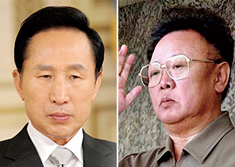 영어토론방 영어토론방 | Home>영어토론방 |
Politics Korean Leadership Crisis
페이지 정보

본문
 The Center for Public Leadership at the John F. Kennedy School of Government at Harvard University recently released its third annual report on a national study of confidence in leadership in America.
The Center for Public Leadership at the John F. Kennedy School of Government at Harvard University recently released its third annual report on a national study of confidence in leadership in America. According to the results, 77 percent of those surveyed believe that there is a leadership crisis in America today. This is up from 65 percent in 2005, the first year of the study.
It would be easy to assume that such high lack of confidence in leadership stems from the general dissatisfaction with the current administration, followed by the increasingly shrill rhetoric among the candidates involved in a fierce public battle to win the upcoming primaries leading up to the presidential election in a year.
Interestingly enough, however, the lack of confidence in national leadership was not limited to politicians.
According to the introduction of the report, ``confidence in many sectors ― from religion to business, from education to nonprofits ― remains tepid and continues to sink."
In fact, the American public's confidence in the leadership of the sectors surveyed did not increase for the second year in a row. Only the military and medical sectors had leadership which enjoyed a moderate level of confidence among the American public.
Such sense of crisis in leadership in America echoes a similar tune in Korea. In fact, the tune of leadership crisis has become an almost unbearable cacophony as we come closer to the presidential election date.
Everyday, the headlines scream the latest developments in the BBK investigation and Samsung bribery allegations. Also, the failures of the two main parties to field unified candidates only adds to the overall chaos. And, of course, Korea recently went through a paroxysm of public scandals with fake academic credentials, sex for favors involving a key official in the Blue House, and ongoing airing of dirty laundry from the closets of celebrities who were assumed to be clean.
Although there have been countless polls done on the relative popular support of the presidential candidates, I have not yet encountered a survey that measured how the Korean people think about leadership. Some of the questions that I am intensely curious about are:
Do the Korean people think leadership is important? How important? Which aspects of leadership are the most important: integrity, experience, vision, charisma, or intelligence? Are Koreans worried that Korea will slip back into a has-been nation unless we get better leaders? And many more.
The more I thought about these questions, the more I became curious as to how similar or different Koreans might respond compared to Americans when it comes to leadership. Therefore, I designed a very simple online polling tool to explore just such questions for readers of The Korea Times and their friends.
The questions explore what leadership means in the Korean context. They won't ask any questions about specific political candidates or parties.
Admittedly, the responders would not all be Korean since a significant percentage of The Korea Times readers live outside Korea.
Further, even those readers who live in Korea are from many different countries. In fact, the only common thread that unites the various far-flung segments of The Korea Times readers is the awareness and knowledge that they share of Korea.
As such, the results would be even more meaningful on an international scale. We will actually be polling the voices of people all over the world ― be they Americans, British, Australians, Brazilians, etc. ― who have an interest in the future of Korea.
The respondents to this poll will reflect two growing and inevitable trends in Korean society. One, Korean-ness is no longer defined solely by national citizenship or where you live. Two, Korean-ness is no longer solely defined by ethnicity, as seen by the dramatic increase of foreigners living in Korea today.
This will truly be a global survey about Korean leadership, the first one of its kind. Since the well-being of Korea depends largely on its international credibility as a nation, as reflected by the confidence that global citizens have about Korea's leadership, the results of this survey can be an important compass for Korea's future direction.
So, let's collectively add some spice to the leadership debate in Korea. It will only take a maximum of 10 minutes and is anonymous and non-attributable. I will share the results in my next column.
Please participate by clicking on the link below and forwarding to colleagues and friends who may want to participate in this public experiment.
Korean Leadership Crisis
By Jason Lim
Question
1. What do you consider your own strengths and weaknesses for leadership?
2. Describe the best leader you have known.
3. "Leadership is more concerned with people than is management" Do you agree? Discuss
이 글은「대학연합영어토론동아리」www.pioneerclub.com에서 제공하는 영어토론 정보입니다.
댓글목록
등록된 댓글이 없습니다.

